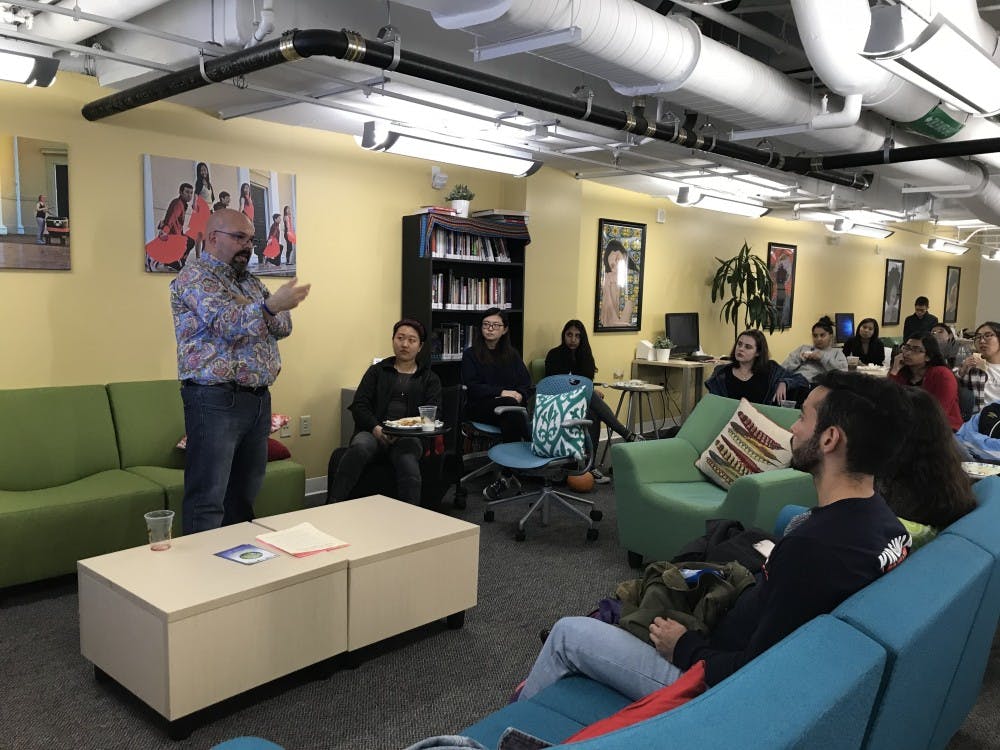Assoc. Spanish Prof. Ricardo Padrón spoke to students last Thursday evening in the Multicultural Student Center on his experience with ethnic identity as an undergraduate at U.Va. in the ’80s, a graduate student in the ’90s and a faculty member since 1997.
Padrón entitled his talk “What’s in a name,” or, alternatively, “Ricardo Padrón’s adventures with whiteness.” He began by sharing a picture of himself with several classmates in the University Guide Service in the ’80s, captioned with the names of those photographed.
“You’ll see on the bottom, I’m not Ricardo Padrón. I’m Ric Padrón. And that’s what I want to talk about,” Padrón told the audience of approximately 25 people, pronouncing both the Americanized and given versions of his name distinctly.
Padrón, born in Ecuador to a Cuban father, discussed his middle class upbringing in Northern Virginia and balancing his Spanish-speaking identity with his white “American” one. He explained how his ability to easily pass as white allowed him to “negotiate his identity.” He considers himself “off-white” — which he says better reflects his racial identity since he does not consider himself white or a person of color.
Padrón spoke about coming to U.Va. and immersing himself in the “preppy world” of the University. Padrón emphasized that by the time he was in his fourth year, he dressed almost exclusively in khakis and button down shirts.
“This is the extent to which I assimilated to this culture,” he said.
Padrón emphasized the role that attending graduate school at the University of Chicago had in transitioning from Ric to Ricardo. In pursuing his master’s degree in religious studies, Padrón chose to focus on Spanish literature, a decision he said connected him to his heritage and led to him shedding “Ric Padrón.”
Padrón said that graduate school helped him embrace his status as an immigrant and a native Spanish speaker, which he kept hidden from others in college in order to conform to the University’s “normative white culture.” He realized the most important thing about being Ricardo Padrón was what it meant to himself — not what it meant to anyone else.
“I guess the moral of my story is that if you can pass for a group that you don’t feel a part of, passing has its costs. Passing has its price, in something that you give up to become white or to become whatever is it you want … passing is not worth it,” he added.
Padrón took questions from the audience, including one from second-year College student Jessica Guo, who asked about increasing diversity at the University.
“There is a sense in which nothing has ever changed at U.Va.” Padrón said. “One of the things that I’ve noticed about U.Va. is that it continues to be a wildly segregated place … when you ask where the students of color are living, they’re in Lambeth, they’re on JPA, on Main Street. But not on Rugby Road.”
Cristhian Vasquez, a third-year Engineering student who attended the talk, told The Cavalier Daily that the lecture was relatable.
“I’m an immigrant,” Vasquez said. “I came here from Colombia four years ago. So I can relate a lot to what he was saying about coming from a different country and trying to belong to a new community.”
Fourth-year College student Stephanie Montoya-Redlich agreed.
“What he was saying about ‘off-white’ — I do consider myself white, but I have that background and that cultural aspect that’s different,” she said.
Padrón gave this talk through the MSC’s “Things I Wish I Knew” speaker series. “Things I Wish I Knew” is an initiative for faculty to share personal experiences on their identity and background, their career path or field of work, or another topic of their choosing.







